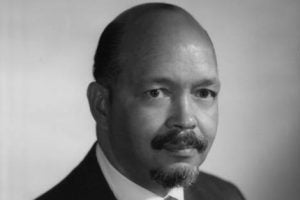 Born in Chicago, Dr. Yerby was the youngest of four children. After finishing high school, he enrolled at the University of Chicago and then went on to study medicine at Meharry Medical College in Nashville, Tennessee—one of only two black U.S. medical colleges in existence at the time. After graduating from Meharry in 1946, he enrolled at the Harvard School of Public Health (as it was known at that time). Dr. Yerby was a student of Franz Goldman, Associate Professor of Medical Care in the Department of Public Health Practice, and at his suggestion went on to work in Germany.
Born in Chicago, Dr. Yerby was the youngest of four children. After finishing high school, he enrolled at the University of Chicago and then went on to study medicine at Meharry Medical College in Nashville, Tennessee—one of only two black U.S. medical colleges in existence at the time. After graduating from Meharry in 1946, he enrolled at the Harvard School of Public Health (as it was known at that time). Dr. Yerby was a student of Franz Goldman, Associate Professor of Medical Care in the Department of Public Health Practice, and at his suggestion went on to work in Germany.
Dr. Yerby worked first as a field medical officer for the U.N.’s International Refugee Organization, where he supervised medical services for displaced persons in refugee camps, followed by service as deputy chief of medical affairs for the Office of the U.N. High Commissioner on Refugees. In 1966, Dr. Yerby left public service to return to the School of Public Health as professor and head of the Department of Health Services Administration (forerunner to the Department of Health Policy and Management), a position he held for the next 16 years. Dr. Yerby—a man whose professional formality masked a warm sincerity beneath—was the only black tenured faculty member at the School, a distinction noted by minority students at the School and throughout Harvard University, who sought him out as a role model and advisor on career issues. He believed that public health was not just the purview of public health professionals but belonged to every physician.




You must be logged in to post a comment.